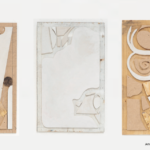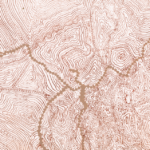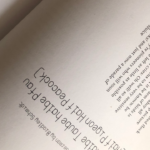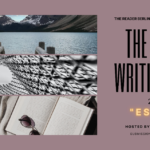I have to sit when I cook. I’m sitting now, against the kitchen wall on a red plastic stool, stirring my tomato sauce. The pasta bubbles calmly, and the kitchen window is foggy. I feel as if my legs have given up on me. My whole body has been giving up lately. It hurts when I’m standing. It hurts when I’m walking. It hurts in completely different places while I’m sitting here. Moving requires energy. As if what was supposed to bind my body together has become fragile and ready to give in at any moment.
I feel old. I feel like I’m performing my pain. I don’t want to turn my pain into a spectacle. But I’m tired of hiding it away.
I wish the pain would just exist. That it could be present without demanding anything of me. But as I sit here, I realize that I have to take it seriously. I must learn to listen to my pain. To understand what it has to say.
This is my effort to stop running away.
─
In 2015, a German doctor wrote the diagnosis of transsexuality (F64.0) into my medical record for the first time. I wanted hormones and my passport still showed an F. I felt lucky because I had escaped the waiting lists of Denmark, and was able to use my blue European health insurance card to talk to a physician who believed in bodily autonomy. The doctor asked me three short questions: How long had I been thinking about beginning hormones? Could I change my F to an M in Denmark? And could I continue my treatment in Denmark? I replied with half-truths.
Today F64.0 is still at the top of my general practitioner’s screen. We haven’t talked about it since the first time I was at their office, years after my first encounter with the diagnosis; long after I had decided I wouldn’t go back to Denmark to see if my lies could come true there as well. While the doctor records my long list of symptoms, I sneak a glance at the screen and see the F64.0 there—like a headline that affects every interpretation of my body.
At each new doctor’s office, I am given a questionnaire. I know the routine by now. One night before yet another appointment, I ask my friends about their experiences. Between “Have you heard about any physical therapists who are not transphobic?” and “I’ve booked an appointment with a gynecologist who seems promising,” we agree that it’s all just guesswork, and that every visit is built on the hope of a better result than the last.
If your gender is not easily readable, you have to constantly tell others about your reality. If the pain in your hips overshadows every joy of a dinner party, you have to ask for the softest chair there is. If you don’t want to talk about it—because you’re constantly thinking about it—it’s hard to ask others for anything.
There are things you have to tell others about. I know. There are things you can keep to yourself. I’ve learned that. I spend my time balancing one and the other. I won’t tell anyone anything. But then I get angry and grumpy when no one takes my hurt into consideration.
I’ll tell you who I am, but then I feel naked.
I think of Emma, whose new partner reminded her to take a break alone in the dark, even though they were on a date.
I think of Mattilda Bernstein Sycamore lying exhausted in the grass: “Have you ever gone to a park with a group of friends, and then you’re so tired you lie in silence in the sun, trying to pass out until you gain enough energy to speak? I mean I’d always connected through speaking, but to connect through not-speaking, this felt like a different kind of camaraderie. I’d found a new group of friends who understood how to politicize queerness through disability. I mean it felt so soft. It felt so calm.”
I think of the look that people get in their eyes when you tell them everything hurts. When you tell them there’s nothing to be done about it. When you shrug your shoulders and say it’s okay. “It’s okay.” You say it to yourself too, hoping it will be true if others believe it for you.
As I write this, my shoulders and neck hurt. It moves into my jaw, which is tense, painful, and draws attention to itself. My elbows buzz. As I write this, I know I should take a break because my wrists are pinching. My little finger feels stiff. My upper arms feel like they’ve been hard at work already. My feet are cold, even though they’re on a heating pad.
When I say I can’t sit in front of a laptop for more than an hour or two a day without unbearable pain, everyone says I need to get myself a height-adjustable desk. As if that is the solution to my problems. As if the problem is that I’m not sitting ‘right’. As if the problem is my surroundings and not my body.
Too often, the problem is my surroundings and not my body.
─
In the morning, walking down the street, in a district I only visit to go to the doctor, I try to decide my answers to the inevitable medical questionnaire. How much do I need to reveal before the doctor sits across from me and I can read their reaction?
When I arrive, I change my mind three times before writing “Testogel” in answer to the question “Do you regularly take medication? If so, which?”
For the most part though, I leave the section blank. I want to avoid trans-broken-arm syndrome: that everything I experience can be led back to this one thing.
I’m here for a new diagnosis. Preferably one that is easy to convey. Something that describes my problems, instead of “this one thing.” My pain, fatigue, headache, dizziness, exhaustion. All of that is still undiagnosed.
I know science is lagging. The research is minimal. The pharmaceutical industry is limiting and prejudiced. They don’t know what’s being affected by hormone therapy. We are not a lucrative group for medical companies. We do not have enough voters for politicians to truly care about us—besides those who hate us.
I ask myself: if things were different, would my ophthalmologist know how hormone therapy affects vision? Could I expect my orthopedist to know about the link between trans identity and knee pain?
There’s a little voice in my head—the one that still thinks honesty is the best strategy—that questions my restraint.
My friends confirm my reality when we check in about the week’s events. They tell me that my paranoia is justified. That the best I can hope for is that my gender doesn’t affect the possibility of my treatment. That I run the risk of my gender being all my doctor can see. My eyes turn into trans eyes—incomprehensible and distracting. My knees to trans knees—a scientific mystery. My hands to trans hands—who knows where the pain comes from!
─
I go to the eye doctor because I get dizzy spells and my head hurts. I remember to take off my light blue nail polish ahead of time and leave my hat at home even though it’s cold. These precautions make it likelier that they won’t look too puzzled when they call for “Herr Reimann” and I stand up.
I think the doctor is a man just because she has a name I can’t immediately place in a gender or language. I think it’s okay for me to gender her because she is gendering me.
When she comes out to get me, we briefly misunderstand each other. I look up, not sure if she just said my last name—her pronunciation is so different from mine. When I get up, deciding it was me she meant, she quickly tries to make her face void of her initial confusion. I think she’s not sure I fit into her idea of “Herr Reimann.” At least, that’s my current version of the story.
The doctor is a short woman with gray streaks in her black hair, and she has a golden butterfly buckle under her ponytail. She is wearing two FFP2 masks on top of each other. I don’t quite understand her accent, because my German is already tense when it comes to medical explanations. I tell her my symptoms and she says, “You may have migraines, so you should go to the neurologist.” Then she says, “It’s mostly women who have migraines.” It takes me a stretched out second before I get her meaning. I don’t know what to say, so I reply, “Okay.”
This isn’t the first time I’ve been told that my symptoms and my gender don’t match. It’s as if my sick body is rebelling against the binary gender system. It refuses to fit in. Sometimes it feels as if my body is betraying me—refusing to cooperate with me to get through these doctor’s visits without causing gender confusion. While the doctor’s comment genders me correctly, it makes me feel misplaced. Outed. False. Wrong. Divorced from my body, my gender, and a cohesive identity.
During the examination, she calls me a child. It’s well-intentioned, but would be a strange thing to say for someone who speaks German as a first language. My own German is also filled with strange twists and turns. When explaining next steps, she doesn’t say “Herr Reimann,” as I am used to hearing, instead she uses my whole name.
On the way home in an overcrowded bus, questions flicker through my head, making me forget what the doctor had said about further examinations: Why did she use my full name? Was it a coincidence because she’s uncomfortable with the German language, or was it an attempt to avoid gendered terms? Was it to give me space, or an effort to not do anything wrong? Although I liked the way she was so different from most German doctors, who are often far too formal and without many words, I feel unsure about her.
─
I keep coming back to this scene in my bathtub. Maybe it’s because I’m naked. There’s something honest about that. Or maybe there’s something pretentious about it. I can’t really decide. In the film Nånting Måste gå Sönder, the main character is also in a bathtub. I don’t remember why. Perhaps by seeing her naked body, we are supposed to understand her vulnerability. As if we can only understand the reality of a trans body if it is visible to us. At the Berlin Porn Film Festival, I saw a short film in which a person in a bathtub was smearing donuts all over their body. I don’t know why either. For me, it was tragic, but funny. For others, it was porn.
I usually use the bathtub to feel my body. When the water is a little too hot, I can’t think of anything else. I know my feet are a part of me when they ache with heat.
The first time I got a hot bath ready for myself after I started transitioning, I was afraid I couldn’t deal with it. I knew of others who have a hard time being naked. I quickly learned that I’d rather float in hot water than avoid nudity.
Today, I lie in my bathtub to make my tension headache go away.
─
The first time I meet with a pain specialist, he tells me that pain can make one feel thin-skinned. He hasn’t looked me in the eye since I walked through the door. He sits behind a sheet of plexiglass, looking back and forth between two screens. When he asks if I feel thin-skinned, I answer “no.” That’s not how I feel. He asks if I have ever been in therapy. “Of course,” I reply. “I used to be depressed and anxious, but it’s not really something I struggle with anymore.” I don’t feel thin-skinned. I feel strong and resilient. It’s true, and I’m proud of it. It’s true, as long as I take care of myself. It’s true, with qualification. But that’s not why it bothers me when he says it.
Thin-skinned is something that is so often said about us. That we can’t take a joke. That we are hypersensitive. That we want others to have unreasonable amounts of consideration for our feelings.
I feel allergic to that description. My skin tingles when the pain doctor says it. He means it as an opportunity for me to open up, to tell him what bothers me, but I feel it as an accusation.
I want credit for all the work I’ve done to avoid going through the world feeling like my skin is too thin to protect me, like a porous shell that lets in too many injuries. I want credit for being misgendered, stared at, questioned, and still surviving my everyday life. Still shopping for groceries, going to work, having meaningful relationships, providing care, and making happy. I’m not thin-skinned. I’ve learned to let in what’s important and taught my body to exclude everything that harms me. It’s been hard work. It is hard work and I want credit for it. I don’t want to see myself as a warrior or a martyr, but I want credit for getting up every day and feeling that life is mostly good, even when it hurts.
The next day, I feel thin-skinned anyway. As if a gust of wind could cause my body to collapse. As if my coffee cup weighs a little too much and my spine can’t hold me up. As if something inside me is ready to break out. Something that feels like grief and pain, something big and fluid that makes my stomach feel like a storm. I feel thin-skinned, not only because the outside can burst me open, but also because my skin is not enough to keep everything that is vulnerable on the inside. My skin is like a water balloon stretched so thin that its bright color softens. What is inside me shows through all the cracks between my interior and the world from which it must be protected. My eyes. My mouth. My fingers and toes.
It is a constant irony that trying to take care of myself, to get diagnoses, and to find new options for treatment must always be linked to more pain, more points where the skin can burst; which enhances this feeling that it is only my thin skin joining my arms to my shoulders; and not my tendons, muscles, and cartilage. My skin makes my shins work together with my knees. It is the reason I have ten fingers and ten toes. I thank my skin for what it does by making myself a meal full of nourishment. An attempt to bribe the body to do what it is supposed to do. What I think it should do.
Later, my skin has regenerated itself in most places. But it feels less elastic. As if too much pulling in one direction would split it like an old plastic sleeve—one that’s no longer pliable, but instead breaks when you try to retrieve the paper that you had hoped it could keep safe. Plastic which has let the emollients seep into what it was supposed to protect. The boundary between inside and outside, the membrane and its contents, has become fluid—and the plastic is stuck to the paper.
The metaphor has run away from me. I no longer know what part of me is protective membrane and what part is my content. Will I have to give up on the separation?
─
I’m pain. I’m canceled appointments. I’m teeth-clenching-attempts to keep my head clear and the conversation open. I’m sensible shoes. I’m open-and-close-my-pants because my stomach hurts, stops hurting, hurts again. I’m exhausted from having to move a bit all the time, so now I lie completely still for hours and accept that it hurts. I’m the relief at getting a specialist appointment I’ve been waiting eight months for. I’m my mother’s hope that my transition can alleviate my back pain.
I’m the continuation of everything my younger self could imagine. I’m the hope that all this will be easier for others, and I’m the grief that it has to be so complicated for me. I’m the fear that my passive body is allowing the world to collapse around me. I’m the frustration at being told that bathtubs are a waste of water.
I’m the compassion of my friends when I cancel again. I’m the pain of having hurt others when I myself was hurt. I’m the comment that I don’t take responsibility for the community. I’m a grateful text message. I’m a regular appointment on FaceTime. I’m the friend who pays for my train ticket because she has a real job and mine is seasonal.
I’m an alarm on my phone reminding me to stretch. I’m an attempt to stop drinking coffee. I’m the resistance to stopping-to-drink-coffee because my life is already full of things I do to “get better.” I’m the acceptance of not getting better. I’m the doctors who say I just need more exercise. I’m the doctors who say I’m not sick the way I think I am, because I am capable of so much exercise. I’m the exhaustion of trying things out, restricting myself, stopping things, contemplating my actions. I’m the fear that there might be a simple solution to my pain if someone else had just kept track of my symptoms.
I’m the idea of a long walk in the rain and the stress under my skin when I know it’s going to be summer again. I’m the joy of talking to a friend who comes by spontaneously and the longing to be alone again.
I’m a “fine,” when people ask me how things are going. I’m the conflict between wanting to tell everything and never wanting to talk about anything again.
Luka Kofoed Reimann is a writer, scholar, and editor who lives in Berlin. His writing is often concerned with questions of identity and belonging and explores his experiences of transition and chronic pain in particular. He is a passionate reader of all kinds of trans* literature and continually hopes to empower others to tell their stories. In 2022, his text “Undiagnosed” was selected as one of the runners-up for the Berlin Writing Prize. Lately, his work has appeared in Danish in Trappe Tusind and English in Overcom Magazine.
KEEP ON READING
Pain Care by Lukas Kofoed Reimann Read More »






